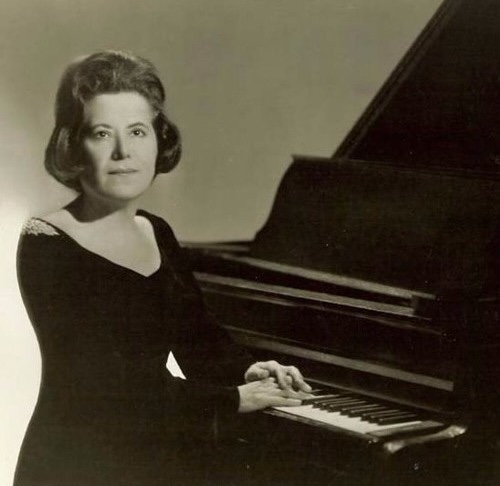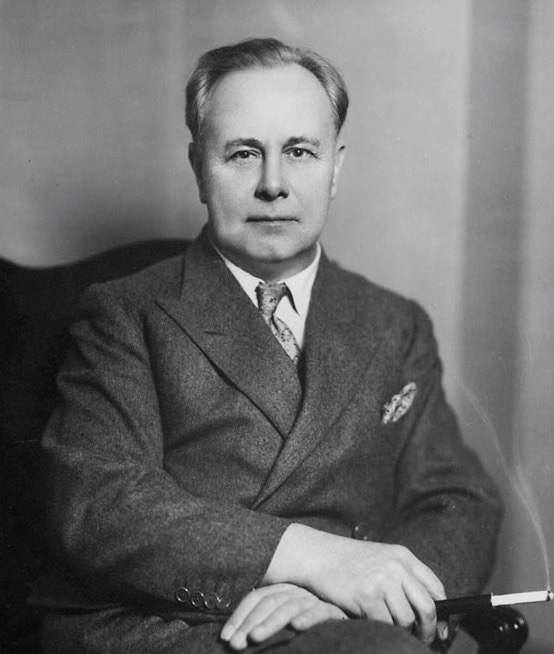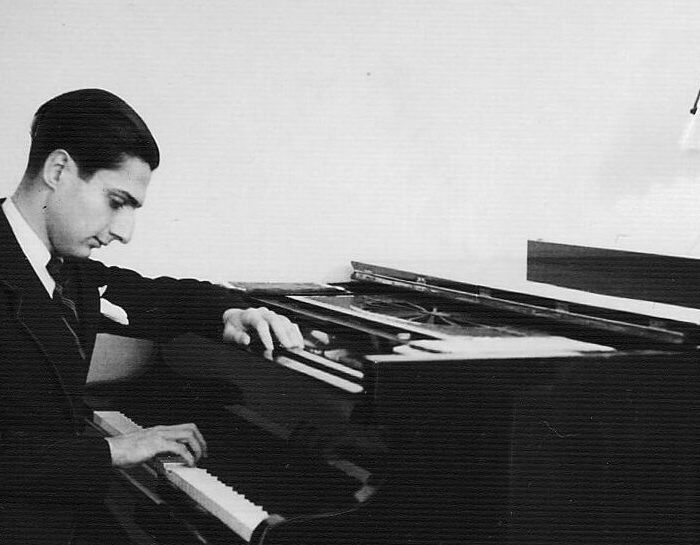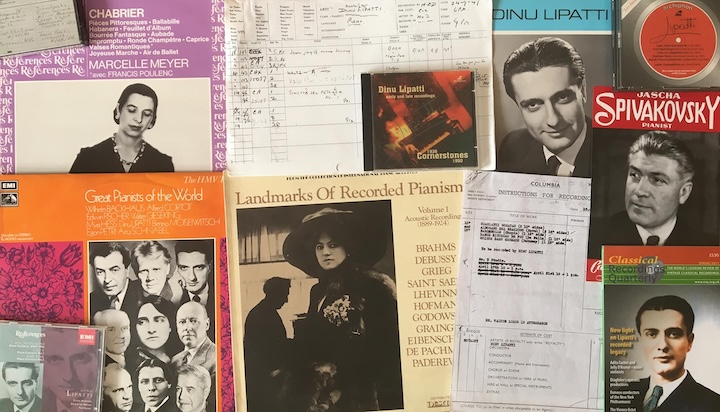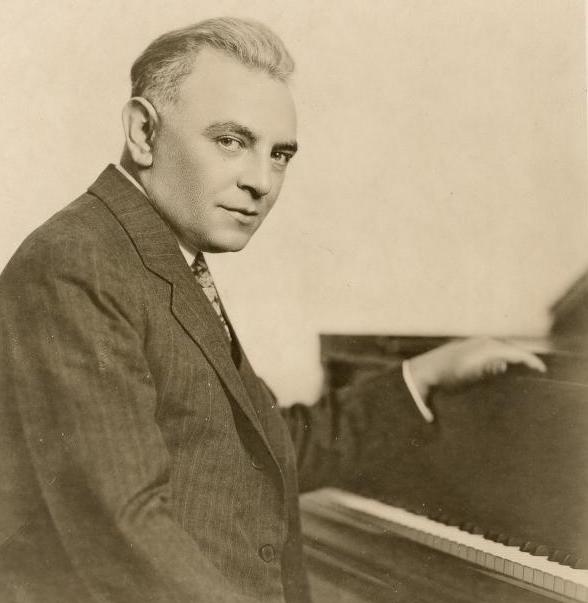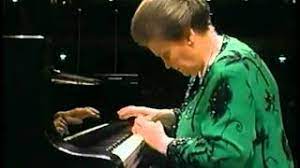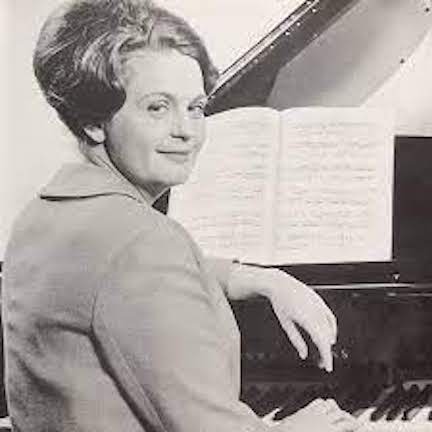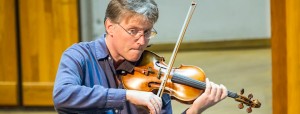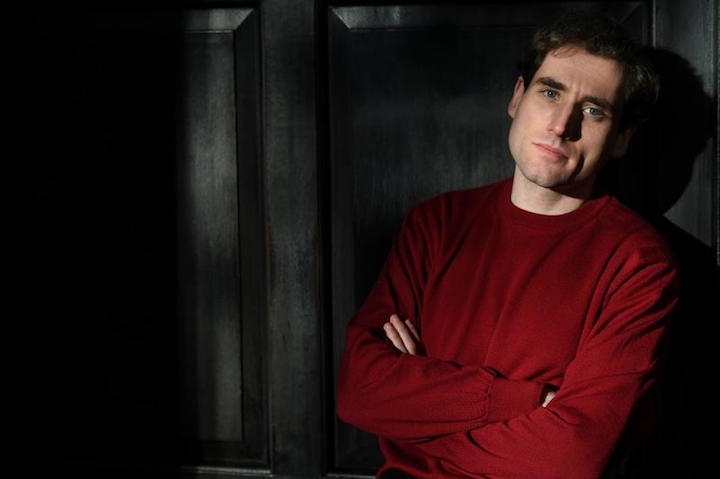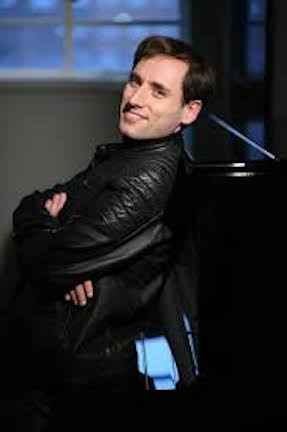The Well-Tempered Ear
Revisit historical and forgotten pianists with Mark Ainley’s ‘Piano Files’
2 Comments
PLEASE HELP THE EAR. IF YOU LIKE A CERTAIN BLOG POST, SPREAD THE WORD. FORWARD A LINK TO IT OR, SHARE IT or TAG IT (not just “Like” it) ON FACEBOOK. Performers can use the extra exposure to draw potential audience members to an event. And you might even attract new readers and subscribers to the blog.
By Jacob Stockinger
Who were Jascha Spivakosky, Gitta Gradova, Wilhelm Backhaus, Marcelle Meyer, Benno Moisiewitsch, Guitar Novaes (below), Eugen Indjic and Solomon — pianists from Russia/Ukraine, the United States, Germany, France, England, Brazil, Serbia/US and England, respectively?
Who was the Polish-American Josef Hofmann (below) and why did Sergei Rachmaninoff and others consider him the greatest pianist of his day while others considered him — and still do — dangerously radical?
Why was the early death of Dino Lipatti (below) such a major loss for classical music?
Most of all: How did these performers play the piano? What made them special? And what did they sound like?
Just ask Mark Ainley (below).
Ainley’s online Piano Files goes back to the earliest days of recordings and resurrects forgotten virtuosi on Facebook and the web.
His frequently posts entries — often on birthdays or anniversaries of deaths and certain concerts — offers concise, well researched and well-written summaries of their lives and careers.
And he finds the best surviving or available recordings by those pianists — usually on YouTube or reissued CDs and LOPs (below) — and links to them so you can hear differences and decide for yourself.
For example, The Ear found the 1930 recording of Chopin mazurkas that Polish pianist Ignaz Friedman (below) recorded (on YouTube at the bottom) quite revealing about historical stylistic and rhythmic differences — freer rubato and hands not always played together — compared to more mainstream interpretations by, say, Arthur Rubinstein or Vladimir Horowitz or Martha Argerich.
You can also learn much about the Big Names, including pianists who studied with students Chopin and Liszt. Ainley celebrates well-known piano virtuosi like Rubinstein, Horowitz, Gina Bachauer, Claudio Arrau, Jorge Bolet and Dame Myra Hess as well.
Ainley’s Piano Files save you a lot of time and searching on your own, and are available for you to subscribe to for downloads and sharing on Facebook:
https://www.facebook.com/ThePianoFilesWithMarkAinley
You can also go to his online website — which I prefer — and bookmark it if you like. There is a lot to explore, to read and listen to. The archives of past entries go back to March of 2011:
https://www.thepianofiles.com/author/Mark
And here is email if you have or a tip or suggestion for Ainley, or a reaction to his site and his written and recorded postings:
What do you think of the Piano Files?
Do you learn anything from them?
Will you use them and enjoy them?
The Ear wants to hear.
Tags: #FacebookPost, #FacebookPosting, 2011, America, American, anniversary, Apple, archives, Arrau, Arthur Rubinstein, Arts, Asia, asian, Bach, Beethoven, Benno Moisiewitsch, big, big names, Bing, birthday, blog, bookmark, Brazil, Carl Mikuli, Chamber music, Chopin, Classical music, classical pianist, classical piano, Claudio Arrau, composer, Concert, concerto, concise, dance, dangerous, death, Dinu Lipatti, download, Early music, effort, England, enjoy, Eugen Indjic, Euorpe, European, explore, Facebook, forget, forgotten, France, Frédéric Chopin, French, Germany, Gina Bachauer, Gitta Gradova, Google, Google Alert, Google Search, Great Britain, Greece, Greek, hands, historical, how, interpret, interpretation, Jacob Stockinger, Jascha Spivakosky, Johann Sebastian Bach, Jorge Bolet, Josef Hofmann, learn, listen, Liszt, loss, Ludwig van Beethoven, Marcelle Meyer, Mark Ainley, Martha Argerich, mazurka, Microsoft, Microsoft Bing, Mikuli, Mozart, Music, Myra Hess, names, neglect, neglected, North America, North American, ok, online, Orchestra, OS, Pianist, pianists, Piano, Piano Files with Mark Ainley, Poland, Polish, Rachmaninoff, Rachmaninov, radical, recording, reserach, rhythm, rubato, Russia, Russian, search, Serb, Serbia, share, Solomon, Sonata, South America, South American, Student, students, subscribe, surviving, Swiss, Switzerland, tag, The Ear, The Well-Tempered Ear, time, U.S., UK, Ukraine, Ukrainean, Ukrainian, United States, University of Wisconsin-Madison School of Music, University of Wisconsin–Madison, use, vintage, virtuoso, Vladimir Horowitz, Website, what, when, why, Wilhelm Backhaus, Wisconsin, Wolfgang Amadeus Mozart, writing, you, YouTube
Meet the Met’s’Mighty Mouse’ — Yannick Nézet-Ségiun
Leave a Comment
PLEASE HELP THE EAR. IF YOU LIKE A CERTAIN BLOG POST, SPREAD THE WORD. FORWARD A LINK TO IT OR, SHARE IT or TAG IT (not just “Like” it) ON FACEBOOK. Performers can use the extra exposure to draw potential audience members to an event. And you might even attract new readers and subscribers to the blog.
By Jacob Stockinger
You might think you already know the famous, high-profile musician and conductor Yannick Nézet-Séguin (below).
The Ear certainly did.
But then I saw the profile and comprehensive interview with the 48-year-old on CBS’ “60 Minutes” last Sunday. And I learned many new things, including how enjoyable and humorous the native French-Canadian can be as well as how he plans to breathe new life and bring new audience into the Met.
I learned how extremely busy he is being the music director of three major artistic organizations: the Metropolitan Opera in New York; the Philadelphia Orchestra; and the Metropolitan Orchestra of Montreal. In addition, he is a prolific recording artist.
I also learned much about his personal life (below, on vacation) and his professional career. You meet his parents and his longtime violist husband.
Not for nothing has the renowned mezzo-soprano Joyce DiDonato affectionately dubbed this openly gay man with the nickname of the cartoon character Mighty Mouse (below) because of his small size but muscular physique, his cheerful and expressive face, and his ambitious rescue mission as the third music director of the Metropolitan Opera in New York City.
Here is a link to the wide-ranging and candid interview, both amusingly serious and seriously amusing, which you can read it or watch and listen to it:
What do you think of Yannick Nézet-Séguin and his plans to revitalize the Metropolitan Opera with contemporary works and younger audiences?
What did you think of the “60 Minutes” interview?
The Ear wants to hear.
Tags: #BlogInterview, #BlogPost, #BlogPosting, #FacebookPost, #FacebookPosting, 60 Minutes, affection, affectionate, ambitious, amusing, Arts, audience, blog, boyfriend, Canada, candid, cartoon, CBS, CBS-TV, Chamber music, character, cheerful, choral music, Classical music, composer, Concert, conductor, contemporary, contemporary opera, enjoyable, face, Facebook, famous, French, French-Canadian, gay, husband, Jacob Stockinger, Joyce Di Donato, Joyce DiDonato, learn, LGBT, LGBTQ, life, link, listen, longtime, Metropolitan Opera, Metropolitan Orchestra of Montreal, Mezzo-soprano, Mighty Mouse, mission, Montreal, Mozart, muscular, Music, Music director, native, new works, New York City, openly gay, opera, Orchestra, parents, partner, Pennsylvania, persionakl, Philadelphia, Philadelphia Orchestra, physique, Piano, plans, professional, profile, read, recording, rescue, revitalize, serious, share, singer, size, small, Sunday, symphony, tag, technology, Television, the Met, thing, things, TV, United States, US, vacation, Viola, violist, vocal music, watch, Yannick, Yannick Nézet-Séguin, young
Collaborative pianist Ingrid Haebler has died at 93
Leave a Comment
PLEASE HELP THE EAR. IF YOU LIKE A CERTAIN BLOG POST, SPREAD THE WORD. FORWARD A LINK TO IT OR, SHARE IT or TAG IT (not just “Like” it) ON FACEBOOK. Performers can use the extra exposure to draw potential audience members to an event. And you might even attract new readers and subscribers to the blog.
By Jacob Stockinger
The Austrian pianist Ingrid Haebler (below) has died at 93.
I call her a collaborative pianist but, like so many other pianists, she was also a soloist.
That is inherent in learning the piano, especially at the beginning.
Here is an obituary, with links, where you can read more about her and her her music-making:
Truth be told, Haebler made quite a few recording as a soloist, include all the piano concertos and piano sonatas by Mozart, as well as other Austrian and German composers, including Haydn, Schubert and Beethoven. The Viennese school was her forte.
But what stands out to The Ear are her early duets (below) with Henry Szeryng and Arthur Grumiaux in the violin sonatas of Beethoven and Mozart. She knew how to blend rather than to stand out, and clearly was more interested in musicality than virtuosity. In fact, critics often praised her gentleness, clarity and transparency rather than her assertiveness or boldness, especially in Mozart. Not for nothing was a tulip named after her.
In a word, she was an ideal collaborative pianist back in the days when they were still called accompanists and received second billing.
Indeed, along with Gerald Moore she was one of the performers who brought currency and respect as the term “accompanist” as it morphed into the more accurate term “collaborative pianist.”
Of course that is just my opinion. You might disagree.
Decide for yourself. You can listen to and sample many of her solo and collaborative recording on YouTube, including the video below one of my favorite violin sonatas by Mozart, the Violin Sonata in e minor, K. 304, played by Haebler and Henryk Szeryng.
Do you know Ingrid Haebler’s playing?
What do you think of her as a soloist and as a collaborative pianist?
Which side of her career do you think is stronger?
The Ear wants to hear.
Tags: #BlogPost, #CollaborativePianist, #FacebookPost, #FacebookPosting, #Music-Making, #YouTubevideo, accompanist, accuracy, accurate, Arthur Grumiaux, Arts, audience, Austria, Austrian, Beethoven, beginning, blog, bold, boldness, career, Chamber music, clarity, Classical music, collaborative, composer, Concert, concerto, critic, currency, death, decide, die, Facebook, favorite, flower, Franz Joseph Haydn, Franz Schubert, gentle, gentleness, Gerald Moore, German, Germany, Haydn, hear, Henryk Szeryng, Ingrid Haebler, Jacob Stockinger, learn, link, listen, Ludwig van Beethoven, morph, Mozart, Music, music critic, musicality, obituary, opinion, Orchestra, performer, Piano, playing, respect, school, Schubert, share, solo, soloist, Sonata, symphony, tag, term, think, transparency, tulip, Vienna, Viennese, Violin, violinist, virtuosity, vocal music, Wolfgang Amadeus Mozart, yourself, YouTube
How will you celebrate World Piano Day today?
22 Comments
PLEASE HELP THE EAR. IF YOU LIKE A CERTAIN BLOG POST, SPREAD THE WORD. FORWARD A LINK TO IT OR, SHARE IT or TAG IT (not just “Like” it) ON FACEBOOK. Performers can use the extra exposure to draw potential audience members to an event. And you might even attract new readers and subscribers to the blog.
By Jacob Stockinger
Today — Tuesday, March 29, 2022 — is World Piano Day.
(Below is a restored vintage concert grand piano at Farley’s House of Pianos used for recitals in the Salon Piano Series.)
How will you mark it? Celebrate it?
It’s a fine occasion to revisit your favorite pianist and favorite piano pieces.
Who is your favorite pianist, and what piano piece would you like to hear today?
If you yourself took piano lessons or continue to play, what piece would you play to mark the occasion? Fo the Ear, it will be either a mazurka by Chopin or a movement from either a French Suite or a Partita by Johann Sebastian Bach. Maybe both!
What piano piece do you wish you could play, but never were able to? For The Ear, it would be the Ballade No. 4 in F minor by Chopin.
One of the best ways to mark the day is to learn about a new younger pianist you might not have heard of.
For The Ear, one outstanding candidate would be the Icelandic pianist Vikingur Olafsson ( below), who has won critical acclaim and who records for Deutsche Grammophon (DG).
Olafsson has a particular knack for innovative and creative programming, like his CD that alternates works by Claude Debussy and Jean-Philippe Rameau.
He also seems at home at in many different stylistic periods. His records every thing from Baroque masters, to Mozart and his contemporaries in the Classical period — including Carl Philipp Emanuel Bach — to Impressionists to the contemporary composer Philip Glass.
But The Ear especially loves his anthology of Bach pieces (below) that include original works and transcriptions, including some arranged by himself. His playing is always precise and convincing, and has the kind of cool water-clear sound that many will identify with Andras Schiff.
You can hear a sample of his beautiful playing for yourself in the YouTube video at the bottom. It is an live-performance encore from his inaugural appearance last August at The Proms in London, where he also played Mozart’s dramatically gorgeous Piano Concerto No. 24 in C minor (also available on YouTube.)
Final word: You might find some terrific pianists and performances on the Internet. Record labels, performing venues and other organizations are marking the day with special FREE recitals that you can reach through Google and Instagram.
Happy playing!
Happy listening!
Please leave a comment and let The Ear and other readers know what you think of the piano — which seems to be falling out of favor these days — and which pianists and piano pieces you will identify this year with World Piano Day.
The Ear wants to hear.
Tags: #AndrasSchiff, #BaroqueEra, #BaroqueMusic, #BlogPost, #BlogPosting, #CarlPhilippEmanuelBach, #Classicalera, #ClaudeDebussy, #CompactDisc, #ConcertGrandPIano, #CriticalAcclaim, #DeutscheGrammophon, #FacebookPost, #FacebookPosting, #Farley'sHouseofPianos, #FredericChopin, #FrenchSuite, #InstagramPost, #Jean-PhilippeRameau, #JohannSebastianBach, #LivePerformance, #PhilipGlass, #PianoConcerto, #PianoLessons, #PianoPiece, #PianoTranscription, #RecordLabel, #SalonPIanoSeries, #TheEar, #TheInternet, #TheProms, #UnitedKingdom, #VikingurOlafsson, #WorldPianoDay, #YouTubevideo, Album, alternate, always, András Schiff, anthology, arrangement, Arts, audience, Bach, Ballade, Baroque, beautuful, best, blog, Blog post, blog posting, Carl Philipp Emanuel Bach, CD, celebrate, Chopin, clarity, Classical era, Classical music, Claude Debussy, clear, Compact Disc, composer, comtemporary, Concert, concert grand, concert grand piano, concerto, conviction, convincing, cool, creative, critical acclaim, day, Debussy, debut, Deutsche Grammophon, DG, dramatic, Early music, encore, England, Facebook, Farley's House of Pianos, favor, favorite, Frédéric Chopin, free, French Impressionism, French Suite, Glass, Google, gorgeous, hear, Home, Iceland, identify, Impressionism, inaugural, innovative, Instagram, Internet, Islandic, Jacob Stockinger, Jean-Philippe Rameau, Johann Sebastian Bach, knack, learn, lesson, link, listen, live performance, London, Love, mark, Master, movement, Mozart, Music, occasion, Orchestra, partita, performing, period, Philip Glass, Pianist, Piano, Piano concerto, piano lesson, piano piece, play, playing, post, precise, program, programming, Rameau, recital, record, Record label, records, restore, Salon Piano Series, sample, share, special, stream, style, stylistic, symphony, tag, terrific, The Ear, The Proms, transcription, UK, United Kingdom, venue, video, Vikingur Olafsson, vintage, water, way, wish, Wolfgang Amadeus Mozart, world, World Piano Day, young, YouTube
Madison’s Sonata à Quattro performs TONIGHT online for the prestigious Boston Early Music Festival
2 Comments
PLEASE HELP THE EAR. IF YOU LIKE A CERTAIN BLOG POST, SPREAD THE WORD. FORWARD A LINK TO IT OR, SHARE IT or TAG IT (not just “Like” it) ON FACEBOOK. Performers can use the extra exposure to draw potential audience members to an event. And you might even attract new readers and subscribers to the blog.
By Jacob Stockinger
The Ear has received the following note from the local early music group, Sonata à Quattro (SAQ):
We have a very exciting announcement to share.
Tonight we will be one of the featured ensembles at the 2021 Boston Early Music Festival Fringe Concerts!
The Boston Early Music Festival (BEMF) is recognized as a national and international leader in the field of early music, and SAQ is thrilled to make its first appearance at this event.
Concert presented during the Boston Early Music Festival’s 2021 Fringe Concerts. Learn more at https://bemf.org/2021-festival/fringe-concerts/
The online premiere of the SAQ concert video will be TONIGHT — Thursday, June 17 — at 7 p.m. ET/6 p.m. CT, and the musicians will be available to chat during and after the recorded performance.
Please join us at this link: https://www.youtube.com/watch?v=tSfzu6Q6DcU
The 50-minute concert, titled “Musical Meditation and Merriment,” features (below, from left) violinists Christine Hauptly Annin and Leanne League; cellist Charlie Rasmussen; and violist Marika Fischer Hoyt.
This period-instrument quartet will perform the following program: Quartet in G Major, TWV 43:G5 by Georg Philipp Telemann (1681-1767); Duo II in D Minor, Op. 19, No. 2, for Violin and Viola by Franz Anton Hoffmeister (1754-1812); Duetto III in G Major, Op. 1, No. 3, for Violin and Cello by Giovanni Battista Cirri (1724-1808, below); and Quartet in D Major, Op. 64, No. “The Lark” by Franz Joseph Haydn (1732-1809).
The concert was live-streamed and recorded at the United Methodist Church in Whitefish Bay, Wis., on April 13, 2021.
From the austere fugal opening of the Telemann to the jaunty Finale of Haydn’s “Lark” Quartet — heard played by the Jerusalem Quartet in the YouTube video at the bottom — this program offers a reflection on the unimaginable year we’ve just experienced, as well as the stirrings of hope, as we awake to a spring and summer of new beginnings.
The slow movements, with their gorgeous string sonorities, range from still, inner contemplation to poignant pleas, while the fast movements outdo one another in wit, verve and sheer joie de vivre.
Tags: #BaroqueMusic, #BejornBerkhout, #BlogPost, #BlogPosting, #BostonEarlyMusicFestival, #BostonMassachusetts, #CentralTime, #ChamberMusic, #CharlieRasmussen, #ChristianChurch, #ChristineHauptlyAnnin, #CityofMadison, #CoronavirusPandemic, #COVID-19, #EasternTime, #FacebookPage, #FacebookPost, #FacebookPosting, #FastMovement, #FranzAntonHoffmeister, #FranzJosephHaydn, #FringeConcerts, #GeorgPhilippTelemann, #GiovanniBatisteCirri, #HistoricallyInformedPerformancePractices, #JacobStockinger, #JerusalemQuartet, #JoiedeVivre, #LarkQuartet, #LeanneLeague, #MadisonWisconsin, #MarikaFischerHoyt, #OnlineConcert, #OnlineFestival, #PeriodInstruments, #RecordedMusic, #SlowMovement, #SonataaQuattro, #StringMusic, #TheEar, #UnitedMethodistChurch, #VirtualConcert, #VirtualFestival, #WhitefishBay, #YouTubeChannel, #YouTubevideo, announcement, appearance, Arts, audience, austere, awake, Baroque, Baroque music, beginning, blog, Boston, Boston Early Music Festival, celiist, cellist, Cello, Central Time, Chamber music, Charlie Rasmussen, chat, Christian, Christian church, Christine Hauptly Annin, church, Classical music, composer, Concert, contemplation, coronavirus, counterpoint, duet, duuo, Early music, Eastern time, ensemble, event, exciting, experience, Facebook, Facebook post, Facebook posting, fast, fast movement, field, finale, first, forward, Franz Anton Hoffmeister, Franz Joseph Haydn, Fringe Concerts, fugal, fugue, Georg Philipp Telemann, George Onslow, Giovanni Battista Cirri, gorgeous, Haydn, help, historically informed performance practices, Hoffmeister, hope, inner, international, Jacob Stockinger, jaunty, Jerusalem, Jerusalem Quartet, joie de vivre, lark, Lark Quartet, leader, Leanne League, learn, like, link, live-stream, local, Madison, Marika Fischer Hoyt, Massachusetts, Meditation, merriment, movement, muisicians, Music, musical, national, new, online, page, pandemic, period instruments, pleas, poignant, post, posting, premiere, present, prestigious, program, recoignize, recorded music, reflection, SAQ, share, Slow movement, Sonata, Sonata à Quattro, sonority, Spring, Still, stirrings, string, string music, summer, tag, Telemann, The Ear, thrilled, tonight, unimaginable, United Methodist Church, United States, vello, verve, video, Viola, Violin, violinist, violist, virtual, Whitefish Bay, Wisconsin, wit, year, YouTube, YouTube channel, YouTube video
Due to popular demand, Wisconsin Youth Symphony Orchestras (WYSO) opens its FREE virtual master classes to the public. Today features the violin and Monday features the bass
Leave a Comment
PLEASE HELP THE EAR. IF YOU LIKE A CERTAIN BLOG POST, SPREAD THE WORD. FORWARD A LINK TO IT OR, SHARE IT or TAG IT (not just “Like” it) ON FACEBOOK. Performers can use the extra exposure to draw potential audience members to an event. And you might even attract new readers and subscribers to the blog.
By Jacob Stockinger
The Wisconsin Youth Symphony Orchestras (WYSO) welcomes back two distinguished and successful alumni this weekend to teach the fifth and sixth master classes in an ongoing series that has already wowed observers. (WYSO alumni are noted below with an asterisk.)
Each virtual event is free and open to the general public with registration required in advance.
“The series has been so fabulous that, due to popular demand, we’ve opened up the events to anyone who wants to attend,” says Susan Gardels, marketing and communications director for WYSO.
TODAY – Sunday, Jan. 10 — from 5:30-7:30 p.m. CST Derek Powell, a violinist with the National Symphony Orchestra in Washington, D.C., will coach four WYSO violin members in a two-hour master class.
This will be followed the next evening with a master class coached by Scott Pingel, Principal Bass with the San Francisco Symphony Orchestra (Monday, Jan. 11, 6:30-8:30 p.m. CST).
A master class presents a one-on-one opportunity for a student musician to learn from a guest artist with an audience invited to observe the process.
In previous master classes in this series, the audience has learned instrument performance techniques and musical interpretation tips from a wide variety of guest artists who professionally play music around the world.
With the master classes presented in an intimate Zoom setting, the audience learns along with the student— and it is amazing to see the sudden growth in a student’s musical prowess as a master class proceeds.
Derek Powell’s bio includes his experience with the New World Symphony where Powell (below) performed as concertmaster with famed conductor Michael Tilson Thomas and as a violinist with the Army Strings, as well as his current experience with the National Symphony Orchestra.
Scott Pingel (below) was a trumpet player in his WYSO days with a side love for electric bass. Pingel switched to concert bass as an undergraduate at UW-Eau Claire, continued studies at the Manhattan School of Music, and played with the New World Symphony and the Charleston Symphony before joining the San Francisco Symphony as Principal Bass in 2004. He recently created buzz by playing with Metallica in a packed house with the San Francisco Orchestra.
For more information, go to: WYSO Amazing Masterclass Series:
Here are details and links to register:
*Derek Powell, Violin Master Class
TODAY, Sunday, Jan. 10, 5:30-7:30 p.m. CST
Free and open to the public
Click here to register in advance
_______________________________
*Scott Pingel, Bass Master Class
Monday, Jan. 11, 6:30-8:30 p.m. CST
Free and open to the public
Click here to register in advance
Here are is a schedule of future WYSO alumni master classes:
Katherine Steele (below), oboe
Sunday, Jan. 17, 6-8 p.m. CST
(Principal Oboe, Milwaukee Symphony Orchestra) https://wysomusic.org/katherine-steel-masterclass/
James Shields (below), clarinet
Sunday, Jan. 24, 7-9 p.m. CST
(Principal Clarinet, Oregon Symphony Orchestra)
Read more about James Shields
*Nancy Goeres (below), bassoon
Sunday, Feb. 7, 6-8 p.m. CST
(Principal Bassoon, Pittsburgh Symphony Orchestra)
Danbi Um (below), violin
Sunday, Feb. 21, Time TBD
(Soloist, member Chamber Music Society of Lincoln Center)
Megumi Kanda (below), trombone
Sunday, Feb. 28, 5:30-7:30 p.m. CST (Principal Trombone, Milwaukee Symphony Orchestra)
David Perry (below), violin
Sunday, March 7, 6-8 p.m. CST
(First Violin, UW-Madison Pro Arte Quartet and UW-Madison Music Professor)
Naha Greenholtz (below), violin
Sunday, March 28, 6-8 p.m. CST
(Concertmaster, Madison Symphony Orchestra and Quad Cities Symphony Orchestra)
*Sharan Leventhal (below), violin
Sunday, April 11, 6-8 p.m. CST
(Boston Conservatory)
For more information, go to https://wysomusic.org or call (608) 733-6283.
Tags: #African-Americanmusician, #ArmyStrings, #AugustaReadThomas, #BassPlayer, #BlackAmericans, #BlogPost, #BlogPosting, #BostonConservatory, #ChamberMusic, #ChamberMusicSocietyofLIncolnCenter, #CharlestonSymphony, #ClarinetMusic, #CommunicationsDirector, #ConcertBass, #DanbiUm, #DavidPerry, #DerekPowell, #ElectricBass, #FacebookPost, #FacebookPosting, #FacultyMember, #GeneralPublic, #GuestArtist, #HomeWebsite, #JacobStockinger, #JamesShields, #KatherineSteele, #LincolnCenter, #MadisonSymphonyOrchestra, #ManhattanSchoolofMusic, #MarketingDirector, #MeadWitterSchoolofMusic, #MegumiKanda, #MichaelTilsonThomas, #MilwaukeeSymphonyOrchestra, #MilwaukeeWisconsin, #MusicCoach, #MusicEducation, #Musicfaculty, #MusicProfessor, #NahaGreenholtz, #NancyGoeres, #NationalSymphony, #NationalSymphonyOrchestra, #NewWorldSymphony, #OboeMusic, #OnlineConcert, #OrchestralMusic, #OregonSymphonyOrchestra, #PittsburghSymphony, #PopularDemand, #PrincipalBass, #PrincipalBassoon, #PrincipalClarinet, #PrincipalOboe, #PrincipalTrombone, #ProArteQuartet, #QuadCitiesSymphonyOrchestra, #RegistrationForm, #RockandRoll, #SanFranciscoSymphony, #ScottPingel, #SharanLeventhal, #TheEar, #TheUW, #UniversityofWisconsin-Madison, #USArmy, #UW-EauClaire, #VirtualConcert, #WashingtonD.C., #WisconsinYouthSymphonyOrchestras, #YouTubevideo, #ZoomMeeting, advance, African American, alumni, alumnus, anyone, Army, Army Strings, Arts, asterisk, audience, bass, Bassoon, bio, black, blog, Boston Conservatory, buzz, call, Chamber music, Chamber Music Society of Lincoln Center, Charleston, Charleston Symphony, clarinet, Classical music, coach, communications, Concert, concert bass, concertmaster, conductor, current, D.C., Danbi Um, David Perry, demand, Derek Powell, details, director, distinguished, electric bass, evening, event, experience, Facebook, Facebook post, Facebook posting, faculty, forward, free, general public, go, guest artist, home website, information, instrument, invite, Jacob Stockinger, James Shields, Katherine Steele, learn, like, LIncoln Center, link, Love, Madison, Madison Symphony Orchestra, Manhattan School of Music, marketing, master class, masterclass, Mead Witter School of Music, Megumi Kanda, member, Mettalica, Michael Tilson Thomas, Milwaukee, Milwaukee Symphony Orchestra, Monday, MSO, MTT, Music, Music education, music faculty, Musician, Naha Greenholtz, Nancy Goeres, National Symphony, National Symphony Orchestra, New World Symphony, noted, Oboe, oboist, observe, observer, online, open, opportunity, Orchestra, orchestral music, Oregon, Oregon Symphony Orchestra, PAQ, performance, Pittsburgh Symphony Orchestra, play, popular, popular demand, post, posting, Principal Clarinet, Principal Oboe, Principal Trombone, prinicipal, Pro Arte Quartet, process, professor, prowess, public, Quad Cities, Quad Cities Symphony, registration, require, rock and roll, San Francisco Symphony, Scott Pingel, series, Sharan Leventhal, share, side, society, solo, soloist, Student, studies, successful, Sunday, switch, symphony, tag, technique, techniques, The Ear, Trombone, trombonist, U.S. Army, undergraduate, United States, University of Wisconsin-Madison School of Music, University of Wisconsin–Madison, UW, UW-Eau Claire, UW-Madison, Violin, violin music, violinist, virtual, Washington, Washington D.C., Website, weekend, welcome, Wisconsin, Wisconsin Youth Symhony Orchestras, wowed, WYSO, Zoom
Pianist Jeremy Denk combines first-rate playing with innovative programs. He performs a virtual online recital this Friday night for the Wisconsin Union Theater
1 Comment
PLEASE HELP THE EAR. IF YOU LIKE A CERTAIN BLOG POST, SPREAD THE WORD. FORWARD A LINK TO IT OR, SHARE IT or TAG IT (not just “Like” it) ON FACEBOOK. Performers can use the extra exposure to draw potential audience members to an event. And you might even attract new readers and subscribers to the blog.
By Jacob Stockinger
Jeremy Denk (below) is not only one of the top pianists on the concert stage today. He is also one of the most interesting and thoughtful pianists when it comes to original, innovative and eclectic programming.
Denk will display his talents again when he performs his third solo recital in Madison this Friday night, Dec. 11, for the Wisconsin Union Theater.
The concert of music by Robert Schumann, Clara Schumann, Johannes Brahms and Missy Mazzoli is at 7:30 p.m. and will be preceded by a public Q&A at 7 p.m. Because of the coronavirus pandemic, both the discussion and the concert will be virtual and online.
Access to the online posting is $20 for the general public, $17 for Wisconsin Union members, and $10 for students.
Denk’s performance, which is part of the Theater’s 101st Annual Concert Series, will include “Papillons” (Butterflies), Op. 2, by Robert Schumann; Three Romances, Op. 21, by Clara Schumann; “Bolts of Loving Thunder” by the contemporary American composer Missy Mazzoli (below); and Four Pieces for Piano, Op. 119, by Johannes Brahms. (You can hear Denk play the lyrically introspective first intermezzo of Brahms’ late Op. 119 in the YouTube video at the bottom.)
To purchase tickets to Denk’s performance, visit https://union.wisc.edu/events-and-activities/event-calendar/event/jeremy-denk/
Ticket buyers will receive an email from the box office approximately 2 hours before the event begins that will contain their link to view the performance. Anyone who purchases a ticket within 2 hours of the event’s start time will receive their email within 15 minutes of purchase.
To The Ear, Denk’s well-planned and fascinating program seems like a probing contrast-and-compare, narrative exploration of the musical styles and close personal relationships – a kind of love triangle — between Robert and Clara Schumann (below top); between Robert Schumann and Johannes Brahms, whom Robert Schumann championed; and between Brahms and Clara Schumann, who also championed Brahms (below bottom) but rejected him as a lover and suitor after the premature death of her husband Robert.
One of America’s foremost pianists, Denk is a winner of a MacArthur “Genius” Fellowship, and the Avery Fisher Prize, and was recently elected to the American Academy of Arts and Sciences.
In the United States, Denk has performed with the Chicago Symphony, New York Philharmonic, Los Angeles Philharmonic, San Francisco Symphony and Cleveland Orchestra and frequently performs at Carnegie Hall. Internationally, he has toured with the world-famous Academy of St. Martin in the Fields and performed at Royal Albert Hall as part of the BBC Proms.
Denk’s talents include writing about music. Some of his stories about music have been featured on the front page of The New York Times Book Review as well as in The New Yorker, The New Republic and The Guardian. Many of those writings form the basis for a forthcoming book.
His passion for composing both music and writing compositions is evident in his music-based blog “Think Denk” — “to think” in German is “denizen” — which dates back to 2005.
“Jeremy Denk is one of the greatest pianists of our generation,” says WUT director Elizabeth Snodgrass. “While many pianists specialize in a particular period or composer, Jeremy is a musical omnivore whose wide-ranging interests span centuries and styles, and he is exceptional at playing all of them. As The New York Times said, he is ‘a pianist you want to hear no matter what he performs.’”
Proof of that can be found in the program “c. 1300-c. 2000” he toured with and recorded last year for Nonesuch, which features a sampling tour of 700 years of keyboard compositions.
Said a critic for the Boston Globe: “Denk has “an unerring sense of the music’s dramatic structure and a great actor’s intuition for timing.”
This performance was made possible by the David and Kato Perlman Chamber Music Endowment Fund.
Learn more about Jeremy Denk at: Facebook | Twitter | Instagram | Website
For more information and a video clip of Denk playing different Brahms, go to: https://union.wisc.edu/events-and-activities/event-calendar/event/jeremy-denk/
Tags: #AcademyofSt.MartinintheFields, #AmericanAcademyofArtsandSciences, #AmericanComposer, #AveryFisherPrize, #BBCProms, #Beautifulmusic, #BlogPost, #BlogPosting, #BoltsofLovingThunder, #BoxOffice, #CarnegieHall, #ChamberMusic, #ChicagoSymphonyOrchestra, #ClevelandOrchestra, #ConcertStage, #ConsortLoanProgram, #Contrast-and-Compare, #CoronavirusPandemic, #COVID-19, #DavidandKatoPerlmanChamberMusicSeries, #DramaticStructure, #ElizabethSnodgrass, #EmailAddress, #FacebookPost, #FacebookPosting, #Fridaynight, #FrontPage, #GeniusGrant, #HomeWebsite, #husband-and-wife, #InstagramPost, #JacobStockinger, #JeremyDenk, #JohannesBrahms, #LastYear, #LosAngeles, #LosAngelesPhilharmonic, #LoveTriangle, #MacArthurFellow, #MacArthurFoundation, #MeadWitterSchoolofMusic, #MissyMazzoli, #MusicalStyle, #NewMusic, #NewYorkCity, #NewYorkPhilharmonic, #NewYorkTimes, #NewYorkTimesBookReview, #NonesuchRecords, #OnlineConcert, #PersonalRelationship, #PianoIntermezzi, #PianoMusic, #RecordedMusic, #RobertSchumann, #RoyalAlbertHall, #SanFranciscoSymphony, #StartTime, #TheEar, #TheGuardian, #TheNewRepublic, #TheNewYorker, #TheU.S., #TheUW, #ThinkDenk, #UnitedStates, #UniversityofWisconsin-Madison, #VirtualConcert, #WiscnsinUnionTheater, #World-famous, #YouTubevideo, Academy of St Martin in the Fields, access, Actor, American, American Academy of Arts and Sciences, Arts, audience, Avery Fisher Prize, basis, BBC, BBC Proms, beautiful, best, blog, Bolts of Loving Thunder, Book, box office, Brahms, butterflies, Carnegie Hall, centuries, Chamber music, champion, Chicago, Chicago Symphony Orchestra, Clara Schumann, Classical music, Cleveland, Cleveland Orchestra, clip, compare, composer, compositions, Concert, concert stage, concerto, contemporary, contrast, coronavirus, David and Kato Perlman Chamber Music Series, Denk, discussion, display, drama, dramatic, Early music, eclectic, Elizabeth Snodgrass, email, event, evident, exceptional, exploration, Facebook, Facebook post, Facebook posting, fascinating, form, forthcoming, forward, Friday, front page, generation, genius grant, German, great, greatest, handful, hear, home website, husband, information, innovate, innovative, Instagram, interesting, interests, intermezzo, international, introspective, intuition, investigation, Jacob Stockinger, Jeremy Denk, Johannes Brahms, Kato Perlman, Keyboard, last year, late, learn, like, link, Los Angeles, Los Angeles Philharmonic, Love, love triangle, lover, loving, lyrical, MacArthur Fellow, MacArthur Foundation, Madison, Mazzoli, Mead Witter School of Music, member, minutes, Missy Mazzoli, Music, musical, musical style, narrative, New Music, New York City, New York Philharmonic, New York Times, New York Times Book Review, night, Nonesuch Records, omnivore, online, original, pandemic, Papillons, particular, Passion, perform, performance, period, personal, personal relationship, Pianist, Piano, piano music, pieces, playing, post, posting, precede, probing, program, programming, public, purchase, Q&A, question-and-answer, receive, recital, record, recorded music, reject, relationship, rhapsody, Robert Schumann, Romance, Royal Albert Hall, sample, sampling, San Francisco, San Francisco Symphony, Schumann, sense, share, solo, spans, specialist, specialize, start, story, structure, Student, style, suitor, tag, talent, The Ear, The Guardian, The New Republic, The New Yorker, Think Denk, thoughtful, time, timing, tour, triangle, Twitter, U.S., unerring, United States, University of Wisconsin-Madison School of Music, University of Wisconsin–Madison, UW, UW-Madison, view, virtual, want, Website, well-planned, wife, Wisconsin, Wisconsin Union Theater, writing, WUT, you, YouTube
Cellist Camille Thomas makes her Madison debut online from Paris for the Wisconsin Union Theater this Saturday night
Leave a Comment
PLEASE HELP THE EAR. IF YOU LIKE A CERTAIN BLOG POST, SPREAD THE WORD. FORWARD A LINK TO IT OR, SHARE IT or TAG IT (not just “Like” it) ON FACEBOOK. Performers can use the extra exposure to draw potential audience members to an event. And you might even attract new readers and subscribers to the blog.
By Jacob Stockinger
The Wisconsin Union Theater’s fall virtual Concert Series performances will begin this Saturday night, Nov. 7, at 7:30 p.m. CST with a live online performance from Paris by the acclaimed cellist Camille Thomas (below).
The “Midnight in Paris” recital – performed in Paris and streamed — features music by Claude Debussy, Nadia Boulanger, Maurice Ravel and Frederic Chopin. The performance will be preceded by a live 30-40 minute online Q&A with Thomas and pianist Julien Brocal on Saturday afternoon at 2 p.m. CST.
Here are the specific works on the program, which will last about 75 minutes with no intermission:
Debussy, “Clair de Lune” (arr. Roelens)
Nadia Boulanger, “Three Pieces” for cello and piano
Ravel, Kaddish
Chopin, Cello Sonata in G Minor, Op. 65; and Introduction et Polonaise brillante, Op. 3
Tickets for this online event are $10 for UW-Madison students, $18 for Wisconsin Union members, and $20 for all other patrons.
For more information about the Thomas’ performance – including a video and how to purchase tickets — visit union.wisc.edu/events-and-activities/event-calendar/event/camille-thomas.
Thomas (below), a Franco-Belgian cellist, says she uses her music to bring people together from a range of cultures and backgrounds. Thomas released her second album, called “Voice of Hope,” with the exclusive Deutsche Grammophon this past June. (In the YouTube video at the bottom, you can hear Thomas play a solo version from the album of Gluck’s “Dance of the Blessed Spirits” from his opera “Orfeo ed Euridice.”)
Thomas plays the Feuermann Stradivarius cello (1730, below) — named for the famous 20th-century cellist Emanuel Feuermann who played it — with a bow by Eugene Sartory, who is regarded as one of the finest bow makers in history. Joining her for this performance will be pianist Julien Brocal.
“Camille Thomas’s extraordinary talent makes her one of the most captivating artists of our time, as evidenced by being the first cellist in several decades to be signed by the major record label Deutsche Grammophon,” says Wisconsin Union Theater director Elizabeth Snodgrass. “Her ‘Midnight in Paris’ program brings us closer to her roots and reflects the beauty and charm of her personality as well as her musicality.”
The Ear has listened to some of Thomas’ performances on YouTube and finds her tone, intonation and phrasing outstanding.
The performance by Camille Thomas is the start of the fall Concert Series events, which includes a concert with pianist Jeremy Denk (below, in a photo by Hiroyuki Ito for The New York Times) on Friday, Dec. 11.
In its 101st year, the Wisconsin Union Theater’s Concert Series is one of the oldest uninterrupted series of its kind in the United States.
The Wisconsin Union Theater (WUT) has served as a cultural center for community members and visitors for more than 75 years. The WUD Performing Arts Committee plans many of the Theater’s events, including the Concert Series.
While usually held in-person and most often in Shannon Hall, the Wisconsin Union Theater team will hold this fall’s theater events in a virtual format for the health and safety of patrons, artists and team members in light of the COVID-19 pandemic.
The team aims for all of its spaces, including online ones, to be accessible. Those that need accommodations can reach out to the Wisconsin Union Theater team at wisconsinuniontheater@union.wisc.edu.
The WUT team says it continues to evaluate what changes may need to occur related to the spring Concert Series events as well as other spring Theater season performances.
The Wisconsin Union Theater has made multiple commitments to take a stand against racial injustice, including being more than allies, being activists; using the arts to create social justice; remembering students are future leaders and must be part of the change; using its voice to influence leadership and being firm in its resolve; and making space, stepping back and learning how to give up undeserved or unnecessary power and privilege.
Tags: #BaroqueMusic, #BaroqueOpera, #BerlinGermany, #BlogPost, #BlogPosting, #CamilleThomas, #CelloBow, #CelloSonata, #CentralStandardTime, #ChamberMusic, #ChristophWillibaldGluck, #Clairdelune, #ClaudeDebussy, #CommunityMembers, #ConcertSeries, #CoronavirusPandemic, #COVID-19, #CulturalCenter, #DanceoftheBlessedSpirits, #DeutscheGrammophon, #ElizabethSnodgrass, #EmanuelFeuermann, #EugeneSartory, #FacebookPost, #FacebookPosting, #FacultyMember, #Franco-Belgian, #FredericChopin, #Fridaynight, #HiroyukiIto, #JacobStockinger, #JeremyDenk, #JulienBrocal, #LiveMusic, #MauriceRavel, #MidnightinParis, #Musicfaculty, #NadiaBoulanger, #NewYorkTimes, #OnlineConcert, #OrfeoedEuridice, #ParisFrance, #PianoAccompanist, #PublicHealth, #RacialInjustice, #RecordedMusic, #RecordLabel, #SaturdayAfternoon, #ShannonHall, #SocialJustice, #StradivariusCello, #TeamMembers, #TheEar, #TheU.S., #TheUS, #TheUW, #UnitedStates, #UniversityofWisconsin, #UniversityofWisconsin-Madison, #VirtualConcert, #VoiceofHope, #WisconsinUnionTheater, #YouTubevideo, accessible, accommodation, accompany, accuracy, activist, afternoon, Album, Allies, arrnagement, artist, artists, Arts, audience, background, Baroque, Baroque music, beauty, Belgian, Belgium, Berlin, blessed, blog, Boulanger, bow, Camille Thomas, captivating, CD, cellist, Cello, cello bow, Cello Sonata, center, Central Standard Time, Chamber music, change, changes, charm, Chopin, Christoph Willibald Gluck, Clair de Lune, Classical music, Claude Debussy, commitments, community, composer, Concert, concert hall, concert series, coronavirus, CST, cultural, cultural center, culture, dance, Dance of the Blessed Spirits, Debussy, decades, Denk, Deutsche Grammophon, DG, director, Early music, Elizabeth Snodgrass, Eugene Sartory, Eurydice, evaluate, event, exclusive, extraordinary, Facebook, faculty, fall, finest, firm, forward, France, Franco-Belgium, Frédéric Chopin, French, Friday, future, German, Germany, Gluck, Health, Hiroyuki Ito, History, hope, in person, influence, information, injustice, intermission, intonation, introduction, Ito, Jacob Stockinger, Jeremy Denk, join, Julien Brocal, June, Kaddish, kind, leaders, leadership, learn, light, like, link, listen, live, live music, Luthier, Madison, major, Maurice Ravel, members, midnight, Midnight in Paris, minute, multiple, Music, musicality, Nadia Boulanger, need, New York Times, night, oldest, online, Op., opera, opus, Orfeo ed Euridice, Orpheus, outstanding, pandemic, Paris, patrons, People, perform, performaer, performance, performer, personality, photo, phrasing, Pianist, Piano, Piano accompanist, polonaise, post, posting, power, precede, privilege, program, public, Public health, purchase, Q&A, question-and-answer, race, racial injustice, racism, range, Ravel, reader, recital, Record label, recorded music, reflects, regard, resolve, roots, safety, Saturday, Shannon Hall, share, sign, social justice, solo, Sonata, spaces, specific, spirit, Spring, start, Strad, Stradivarius, stream, Student, students, subscriber, tag, talent, team, team members, The Ear, tickets, time, together, tone, U.S., undeserved, uninterrupted, United States, University of Wisconsin, University of Wisconsin–Madison, unnecessary, US, use, UW, UW-Madison, version, virtual, visitors, voice, Voice of Hope, Wisconsin, Wisconsin Union Theater, work, years, YouTube
Classical music: A good pandemic project for the Beethoven Year is to follow Boris Giltburg as he learns and posts all 32 piano sonatas in one year
3 Comments
PLEASE HELP THE EAR. IF YOU LIKE A CERTAIN BLOG POST, SPREAD THE WORD. FORWARD A LINK TO IT OR, SHARE IT or TAG IT (not just “Like” it) ON FACEBOOK. Performers can use the extra exposure to draw potential audience members to an event. And you might even attract new readers and subscribers to the blog.
By Jacob Stockinger
There are a lot of ways that musicians are celebrating the Beethoven Year of 2020 – the 250th anniversary of the birth of the composer (below).
One of the most interesting ways also makes for an engaging and ongoing coronavirus pandemic project.
The prize-winning Russian-Israeli pianist Boris Giltburg (below in a photo by Sasha Gusov) is learning all 32 piano sonatas in one year.
It is a formidable challenge, not only because most of the sonatas are technically and musically difficult, but also because the pianist says he has played only nine of the 32 sonatas before.
Giltburg’s videos feature not only fine playing and interpretations, but also a very readable and informative diary he writes that includes notes – also available in German on the website — about the sonatas and about what the process of learning and playing them has been like.
His approach works and makes you a vicarious participant in the major undertaking.
He posts performances of the sonatas every few weeks. He is learning and posting them in chronological order so you get a sense of the evolution. Giltburg is now up to Sonata No. 9 in E Major, Op. 14, No. 1.
Here is some background about Giltburg from Wikipedia: https://en.wikipedia.org/wiki/Boris_Giltburg
And here is a link to more background at his personal website where you can also find information about his other recordings for Naxos (he is known for his Liszt, Rachmaninoff, Scriabin and Prokofiev) and concerts: https://borisgiltburg.com
But the heart of the project is at Beethoven32.com where you can find the sonatas starting from the first.
The Ear likes hearing them this way.
Listening to them one at a time and reading about them seems a less overwhelming way to become familiar with what is called “The New Testament” – as compared to the Old Testament of the 48 preludes and fugues in Bach’s “The Well-Tempered Clavier.”
The Ear finds the playing first-rate and the sound quality excellent with great close-up videos of the keyboard and Giltberg’s playing.
Here is a link to the main website, which is easier than hunting for individual sonatas on YouTube: https://beethoven32.com
The Ear suggests starting at the bottom with Giltberg’s introduction and then working your way up one at a time, allowing time to appreciate both the music and his diary notes.
To get you started, here his introduction to the project:
https://www.youtube.com/watch?v=qeBrn_kwvfg
And below is his performance the Sonata No. 1 in F minor, Op. 2, No. 1.
Let us know what you think of Giltberg as a Beethoven interpreter and what you think of his sonata project.
The Ear wants to hear.
Tags: #AlexanderScriabin, #BlogPost, #BlogPosting, #BorisGiltburg, #ChronologicalOrder, #COVID-19, #FacebookPost, #FacebookPosting, #FranzLiszt, #HomeWebsite, #IsraeliMusician, #JacobStockinger, #JohannSebastianBach, #LudwigVanBeethoven, #NaxosRecords, #NewTestament, #OldTestament, #PianoSonata, #Prize-Winning, #ProgramNotes, #SergeiProkofiev, #SergeiRachmaninoff, #SergeiRachmaninov, #TheEar, #Well-TemperedClavier, #Wikipediabiography, #Wikipediaentry, #YouTubevideo, 2020, Alexander Scriabin, anniversary, approach, Arts, audience, available, Bach, background, Beethoven, birth, blog, Boris Giltburg, challenge, challenging, chronological, Classical music, close-up, composer, Concert, coronavirus, covid, diary, difficult, excellent, Facebook, familiar, few, fine, first-rate, formidable, forward, Franz Liszt, fugue, German, Germany, Giltburg, hear, heart, home website, hunt, individual, informative, interesting, interpretation, interpreter, introduction, Israel, Israeli, Jacob Stockinger, Johann Sebastian Bach, learn, learning, like, link, listen, Liszt, Ludwig van Beethoven, make, Music, musical, Musician, Naxos, Naxos Records, New Testament, notes, Old Testament, order, overwhelming, pandemic, participant, performance, performer, personal, Pianist, Piano, playing, post, posting, Prelude, process, project, Prokofiev, quality, Rachmaninoff, Rachmaninov, readable, recording, Russia, Russian, Scrabin, Sergei Prokofiev, Sergei Rachmaninoff, Sergei Rachmaninov, share, Sonata, Sound, start, tag, technical, The Ear, The Well-Tempered Clavier, time, undertaking, vicarious, video, way, Website, week, Well-Tempered Clavier, Wikipedia, year, YouTube
Classical music: This summer’s Madison Early Music Festival in July has been cancelled and postponed until next summer
Leave a Comment
PLEASE HELP THE EAR. IF YOU LIKE A CERTAIN BLOG POST, SPREAD THE WORD. FORWARD A LINK TO IT OR, SHARE IT or TAG IT (not just “Like” it) ON FACEBOOK. Performers can use the extra exposure to draw potential audience members to an event. And you might even attract new readers and subscribers to the blog.
By Jacob Stockinger
The Ear has received the following announcement from the Madison Early Music Festival (MEMF) to share:
| Dear MEMF Family,
Due to the University of Wisconsin-Madison’s decision to suspend in-person courses, workshops and conferences for the summer term because of the ongoing COVID-19 pandemic, the Madison Early Music Festival (MEMF) has been postponed until July 10–17, 2021.
This extraordinary situation has affected all of us and we will miss seeing you this summer. Updates will be posted on our website as they are available.
As you can imagine, this was a difficult decision but a necessary one. We will miss sharing the Burgundian experience with everyone — MEMF is always the highlight of our summer.
We already miss our community of participants gathering together in Madison, listening to concerts in the new Hamel Music Center, learning from our extraordinary faculty, dancing together in Great Hall and relaxing on the Union Terrace. (In the YouTube video at the bottom is an excerpt from the All-Festival Concert last year.)
The good news is, we have decided to simply move the scheduled program forward to next season. We sincerely hope that The Good, the Bold and the Fearless: Musical Life at the Burgundian Court will feature the same guest artists and faculty next year and we hope you will be able to join us in 2021.
In the meantime, the Madison Early Music Festival will continue to operate. For those who have already registered, we will contact you about issuing refunds and answering any other questions you might have.
Finally, we appreciate your support — you are the reason that MEMF continues to offer such extraordinary programming, concerts and instruction year after year. But we appreciate it even more now.
If you can make a donation to help offset some of the costs that this year’s Festival can’t recoup, we would be extremely grateful. Your gift today will ensure that we can return “better than ever” next year.
Please stay safe and healthy, Cheryl, Paul and Sarah Cheryl Bensman-Rowe and Paul Rowe, Co-Artistic Directors (below) Sarah Marty, Program Director |
Tags: #All-FestivalConcert, #ArtisticDirector, #BlogPost, #BlogPosting, #BurgundianMusic, #BurgundyFrance, #CherylBensman-Rowe, #CommunitySupport, #CourtMusic, #COVID-19, #FacebookPost, #FacebookPosting, #FinancialSupport, #GoodNews, #GreatHall, #GuestArtist, #HamelMusicCenter, #JacobStockinger, #MadisonEarlyMusicFestival, #MeadWitterSchoolofMusic, #MusicalExcerpt, #MusicEducation, #Musicfaculty, #NextYear, #PaulRowe, #SarahMarty, #Shelter-inPlace, #Stayathome, #TheEar, #UnionTerrace, #UniversityofWisconsin-Madison, 2020, 2021, All-Festival concert, announcement, answer, appreciate, Artistic director, audience, better, blog, bold, Burgundian, Burgundy, cancel, Cheryl Bensman Rowe, community, conference, coronavirus, costs, course, court, dance, dancing, decision, difficult, donate, donation, Early music, earlymusic, ensure, ever, excerpt, experience, extraordinary, extreme, extremely, Facebook, faculty, fearless, festival, financial support, France, gift, good, good news, grateful, Great Hall, guest artist, Hamel Music Center, healthy, highlight, Home, hope, in person, instruction, issue, Jacob Stockinger, join, July, learn, life, like, link, Madison, Madison Early Music Festival, Mead Witter School of Music, meantime, MEMF, miss, move, Music education, music faculty, musical, necessary, new, news, next year, offset, online, pandemic, participant, Paul Rowe, performer, please, post, posting, postpone, program, programming, question, receive, refund, register, relax, relaxing, safe, Sarah Marty, schedule, share, shelter in place, situation, stay, summer, support, suspend, tag, The Ear, today, together, Union Terrace, University of Wisconsin-Madison School of Music, University of Wisconsin–Madison, update, UW, UW-Madison, Website, workshop, year
- May 2024
- April 2024
- March 2024
- February 2024
- January 2024
- December 2023
- November 2023
- October 2023
- September 2023
- August 2023
- July 2023
- June 2023
- May 2023
- April 2023
- March 2023
- February 2023
- January 2023
- December 2022
- October 2022
- September 2022
- June 2022
- May 2022
- April 2022
- March 2022
- July 2021
- June 2021
- May 2021
- April 2021
- March 2021
- February 2021
- January 2021
- December 2020
- November 2020
- October 2020
- September 2020
- August 2020
- July 2020
- June 2020
- May 2020
- April 2020
- March 2020
- February 2020
- January 2020
- December 2019
- November 2019
- October 2019
- September 2019
- August 2019
- July 2019
- June 2019
- May 2019
- April 2019
- March 2019
- February 2019
- January 2019
- December 2018
- November 2018
- October 2018
- September 2018
- August 2018
- July 2018
- June 2018
- May 2018
- April 2018
- March 2018
- February 2018
- January 2018
- December 2017
- November 2017
- October 2017
- September 2017
- August 2017
- July 2017
- June 2017
- May 2017
- April 2017
- March 2017
- February 2017
- January 2017
- December 2016
- November 2016
- October 2016
- September 2016
- August 2016
- July 2016
- June 2016
- May 2016
- April 2016
- March 2016
- February 2016
- January 2016
- December 2015
- November 2015
- October 2015
- September 2015
- August 2015
- July 2015
- June 2015
- May 2015
- April 2015
- March 2015
- February 2015
- January 2015
- December 2014
- November 2014
- October 2014
- September 2014
- August 2014
- July 2014
- June 2014
- May 2014
- April 2014
- March 2014
- February 2014
- January 2014
- December 2013
- November 2013
- October 2013
- September 2013
- August 2013
- July 2013
- June 2013
- May 2013
- April 2013
- March 2013
- February 2013
- January 2013
- December 2012
- November 2012
- October 2012
- September 2012
- August 2012
- July 2012
- June 2012
- May 2012
- April 2012
- March 2012
- February 2012
- January 2012
- December 2011
- November 2011
- October 2011
- September 2011
- August 2011
- July 2011
- June 2011
- May 2011
- April 2011
- March 2011
- February 2011
- January 2011
- December 2010
- November 2010
- October 2010
- September 2010
- August 2010
- July 2010
- June 2010
- May 2010
- April 2010
- March 2010
- February 2010
- January 2010
- December 2009
- November 2009
- October 2009
- September 2009
- August 2009
Archives
- 2,493,280 hits
Blog Stats
Recent Comments
| welltemperedear on What do you think of the… | |
| Scott on What do you think of the… | |
| welltemperedear on Yunchan Lim’s Chopin etudes ar… | |
| bratschespeilerin on What do you think of the… | |
| MARVIN P WICKENS on Yunchan Lim’s Chopin etudes ar… |
Tags
#BlogPost #BlogPosting #ChamberMusic #FacebookPost #FacebookPosting #MeadWitterSchoolofMusic #TheEar #UniversityofWisconsin-Madison #YouTubevideo Arts audience Bach Baroque Beethoven blog Cello Chamber music choral music Classical music Compact Disc composer Concert concerto conductor Early music Facebook forward Franz Schubert George Frideric Handel Jacob Stockinger Johannes Brahms Johann Sebastian Bach John DeMain like link Ludwig van Beethoven Madison Madison Opera Madison Symphony Orchestra Mead Witter School of Music Mozart Music New Music New York City NPR opera Orchestra Overture Center performer Pianist Piano post posting program share singer Sonata song soprano String quartet Student symphony tag The Ear United States University of Wisconsin-Madison School of Music University of Wisconsin–Madison Viola Violin vocal music Wisconsin Wisconsin Chamber Orchestra wisconsin public radio Wolfgang Amadeus Mozart YouTube